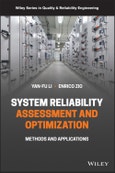This book offers a comprehensive overview of recently developed methods for assessing and optimizing system reliability. It consists of two main parts, for treating assessment methods and optimization methods, respectively.
The first part covers methods of multi-state system reliability modelling and evaluation, Markov processes, Monte Carlo simulation and uncertainty analysis. The methods considered range from piecewise-deterministic Markov processes to belief function analysis. The second part covers optimization methods of mathematical programming and evolutionary algorithms, and problems of multi-objective optimization and optimization under uncertainty. The methods of this part range from non-dominated sorting genetic algorithm to robust optimization.
The book also includes the application of the assessment and optimization methods considered on real case studies, particularly with respect to the reliability assessment and optimization of renewable energy systems, and bridges the gap between theoretical method development and engineering practice.
Table of Contents
Series Editor’s Foreword by Dr. Andre V. Kleyner xv
Preface xvii
Acknowledgments xix
List of Abbreviations xx
Notations xxii
Part I The Fundamentals 1
1 Reliability Assessment 3
1.1 Definitions of Reliability 3
1.1.1 Probability of Survival 3
1.2 Component Reliability Modeling 6
1.2.1 Discrete Probability Distributions 6
1.2.2 Continuous Probability Distributions 8
1.2.3 Physics-of-Failure Equations 13
1.3 System Reliability Modeling 15
1.3.1 Series System 15
1.3.2 Parallel System 16
1.3.3 Series-parallel System 16
1.3.4 K-out-of-n System 17
1.3.5 Network System 18
1.4 System Reliability Assessment Methods 18
1.4.1 Path-set and Cut-set Method 18
1.4.2 Decomposition and Factorization 19
1.4.3 Binary Decision Diagram 19
1.5 Exercises 20
References 22
2 Optimization 23
2.1 Optimization Problems 23
2.1.1 Component Reliability Enhancement 23
2.1.2 Redundancy Allocation 24
2.1.3 Component Assignment 25
2.1.4 Maintenance and Testing 26
2.2 Optimization Methods 30
2.2.1 Mathematical Programming 30
2.2.2 Meta-heuristics 34
2.3 Exercises 36
References 37
Part II Reliability Techniques 41
3 Multi-State Systems (MSSs) 43
3.1 Classical Multi-state Models 43
3.2 Generalized Multi-state Models 45
3.3 Time-dependent Multi-State Models 46
3.4 Methods to Evaluate Multi-state System Reliability 48
3.4.1 Methods Based on MPVs or MCVs 48
3.4.2 Methods Derived from Binary State Reliability Assessment 48
3.4.3 Universal Generating Function Approach 49
3.4.4 Monte Carlo Simulation 50
3.5 Exercises 51
References 51
4 Markov Processes 55
4.1 Continuous Time Markov Chain (CMTC) 55
4.2 In homogeneous Continuous Time Markov Chain 61
4.3 Semi-Markov Process (SMP) 66
4.4 Piecewise Deterministic Markov Process (PDMP) 74
4.5 Exercises 82
References 84
5 Monte Carlo Simulation (MCS) for Reliability and Availability Assessment 87
5.1 Introduction 87
5.2 Random Variable Generation 87
5.2.1 Random Number Generation 87
5.2.2 Random Variable Generation 89
5.3 Random Process Generation 93
5.3.1 Markov Chains 93
5.3.2 Markov Jump Processes 94
5.4 Markov Chain Monte Carlo (MCMC) 97
5.4.1 Metropolis-Hastings (M-H) Algorithm 97
5.4.2 Gibbs Sampler 98
5.4.3 Multiple-try Metropolis-Hastings (M-H) Method 99
5.5 Rare-Event Simulation 101
5.5.1 Importance Sampling 101
5.5.2 Repetitive Simulation Trials after Reaching Thresholds (RESTART) 102
5.6 Exercises 103
Appendix 104
References 115
6 Uncertainty Treatment under Imprecise or Incomplete Knowledge 117
6.1 Interval Number and Interval of Confidence 117
6.1.1 Definition and Basic Arithmetic Operations 117
6.1.2 Algebraic Properties 118
6.1.3 Order Relations 119
6.1.4 Interval Functions 120
6.1.5 Interval of Confidence 121
6.2 Fuzzy Number 121
6.3 Possibility Theory 123
6.3.1 Possibility Propagation 124
6.4 Evidence Theory 125
6.4.1 Data Fusion 128
6.5 Random-fuzzy Numbers (RFNs) 128
6.5.1 Universal Generating Function (UGF) Representation of Random-fuzzy Numbers 129
6.5.2 Hybrid UGF (HUGF) Composition Operator 130
6.6 Exercises 132
References 133
7 Applications 135
7.1 Distributed Power Generation System Reliability Assessment 135
7.1.1 Reliability of Power Distributed Generation (DG) System 135
7.1.2 Energy Source Models and Uncertainties 136
7.1.3 Algorithm for the Joint Propagation of Probabilistic and Possibilistic Uncertainties 138
7.1.4 Case Study 140
7.2 Nuclear Power Plant Components Degradation 140
7.2.1 Dissimilar Metal Weld Degradation 140
7.2.2 MCS Method 145
7.2.3 Numerical Results 147
References 149
Part III Optimization Methods and Applications 151
8 Mathematical Programming 153
8.1 Linear Programming (LP) 153
8.1.1 Standard Form and Duality 155
8.2 Integer Programming (IP) 159
8.3 Exercises 164
References 165
9 Evolutionary Algorithms (EAs) 167
9.1 Evolutionary Search 168
9.2 Genetic Algorithm (GA) 170
9.2.1 Encoding and Initialization 171
9.2.2 Evaluation 172
9.2.3 Selection 173
9.2.4 Mutation 174
9.2.5 Crossover 175
9.2.6 Elitism 178
9.2.7 Termination Condition and Convergence 178
9.3 Other Popular EAs 179
9.4 Exercises 181
References 182
10 Multi-Objective Optimization (MOO) 185
10.1 Multi-objective Problem Formulation 185
10.2 MOO-to-SOO Problem Conversion Methods 187
10.2.1 Weighted-sum Approach 188
10.2.2 ε-constraint Approach 189
10.3 Multi-objective Evolutionary Algorithms 190
10.3.1 Fast Non-dominated Sorting Genetic Algorithm (NSGA-II) 190
10.3.2 Improved Strength Pareto Evolutionary Algorithm (SPEA 2) 193
10.4 Performance Measures 197
10.5 Selection of Preferred Solutions 200
10.5.1 “Min-Max” Method 200
10.5.2 Compromise Programming Approach 201
10.6 Guidelines for Solving RAMS+C Optimization Problems 201
10.7 Exercises 203
References 204
11 Optimization under Uncertainty 207
11.1 Stochastic Programming (SP) 207
11.1.1 Two-stage Stochastic Linear Programs with Fixed Recourse 209
11.1.2 Multi-stage Stochastic Programs with Recourse 217
11.2 Chance-Constrained Programming 218
11.2.1 Model and Properties 219
11.2.2 Example 221
11.3 Robust Optimization (RO) 222
11.3.1 Uncertain Linear Optimization (LO) and its Robust Counterparts 223
11.3.2 Tractability of Robust Counterparts 224
11.3.3 Robust Optimization (RO) with Cardinality Constrained Uncertainty Set 225
11.3.4 Example 226
11.4 Exercises 228
References 229
12 Applications 231
12.1 Multi-objective Optimization (MOO) Framework for the Integration of Distributed Renewable Generation and Storage 231
12.1.1 Description of Distributed Generation (DG) System 232
12.1.2 Optimal Power Flow (OPF) 234
12.1.3 Performance Indicators 235
12.1.4 MOO Problem Formulation 237
12.1.5 Solution Approach and Case Study Results 238
12.2 Redundancy Allocation for Binary-State Series-Parallel Systems (BSSPSs) under Epistemic Uncertainty 240
12.2.1 Problem Description 240
12.2.2 Robust Model 241
12.2.3 Experiment 243
References 244
Index 245








